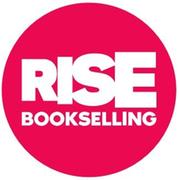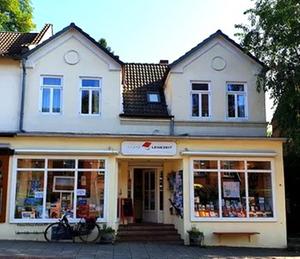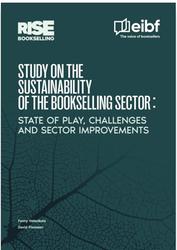 A Monday morning panel at the RISE Bookselling Conference in Lisbon, Portugal, earlier this week focused on sustainable bookselling, with panelists from Germany, Slovakia, and France discussing the steps they've taken to make their stores more sustainable.
A Monday morning panel at the RISE Bookselling Conference in Lisbon, Portugal, earlier this week focused on sustainable bookselling, with panelists from Germany, Slovakia, and France discussing the steps they've taken to make their stores more sustainable.
Maria Hamrefors, chairwoman of the Swedish Booksellers Association, served as moderator, while Svenja Esch, owner of Lesumer Lesezeit in Bremen, Germany, Anna Porubcová, head of sustainability for Slovakian book chain Martinus Bookshop, and Mathilde Charrier, a bookseller in Paris and member of the Association pour l'écologie du livre (Association for Ecology of the Book), made up the panel.
Esch explained how her 50-square-meter (approximately 540 square feet) store was chosen to be a "blueprint" store for a program by the Börsenverein, the German association of booksellers, publishers, and distributors, to become climate neutral.
The process began around November 2021, with a visit from an outside consultant who assessed the bookstore's carbon emissions, factoring in heating, lighting, electricity usage, computer systems, and more. She noted that for the purposes of this program, the carbon footprint of the individual books she carries was not counted. There was a lot of "heated discussion" around that in the beginning, Esch recalled, but they decided not to include those supply-chain emissions in the shop's footprint and instead focus on things booksellers could more directly control.

|
|
| Lesumer Lesezeit | |
That initial assessment revealed that Esch's bookstore had a footprint of about 15 tons of carbon, and since the program began, Esch has been able to reduce that footprint by about half. As a renter, Esch cannot control things like putting in solar panels or completely overhauling the building's heating system. Instead, she has taken "a million little steps" toward sustainability, including putting in new, energy efficient lighting, and installing thermostats that can automatically switch off the heat. She recalled being "astonished" by just how much heating contributed to the store's footprint, and she noted that even small steps in that regard can make an impact.
As a place to start, she suggested that if possible, booksellers find a consultant or outside expert to assess their store's emissions. Without that knowledge, it is hard to know what areas need the most improvement. Esch also touched on compensating, or off-setting, carbon emissions. She supports a number of carbon compensation programs in her area and said she chose those because she knows what work they're doing and can understand that her support is having an impact.
Esch hopes soon to get her store's emissions down to about three tons of carbon, and called it a "game changer" that her building was recently purchased by a new owner interested in sustainable improvements like solar panels. She also referred to her store's return rate of a little over 5% as a "soft spot," and she plans to make reducing returns her "next big project."
Porubcová explained that she is responsible for implementing sustainable solutions for a bookstore chain that has 17 bricks-and-mortar locations in Slovakia and one in Czechia, as well as an online store. Martinus has about 250 full-time employees, and part of Porubcová's work is preparing the chain for Environmental, Social and Corporate Governance reporting, which will become mandatory in the European Union for companies of that size and larger.
In terms of the practical improvements that Martinus has made, Porubcová called a lot of them "low-hanging fruit," though she did highlight three particular initiatives. The first was measuring the company's carbon emissions, with scope 3 emissions, including supply-chain emissions, being by far the hardest to measure accurately. The bookstore also started selling secondhand books, and while it was done in the interest of sustainability, Porubcová cautioned that they do not yet have hard data on the climate benefits of selling used books compared to new books. Martinus has also implemented solutions for energy optimization, but those were mostly the result of an energy crisis rather than the environment.
Porubcová said the most important thing for her, and anyone else trying to implement sustainable solutions in large companies, is having management on their side. In her case, it "took some time," but gradually they became "more and more on board." She also agreed with Esch on the value of having outside experts accurately assess emissions. And for returns, she reported that her company's returns rate was about 14% in 2019, which combines the rates for both the bricks-and-mortar stores and the online store. When separated, she said, the rate for the bricks-and-mortar stores is much higher than the online store.
Charrier recalled that when she began her career as a bookseller some four years ago, she was "shocked" to see so many "not very sustainable practices," particularly returns. She felt she "didn't want to do my job like this," and wrote an article about bookselling and unsustainable practices. That led her to meeting others interested in ecology and sustainability and eventually to the founding of the Association pour l'écologie du livre and the publication of a manifesto providing a "systemic vision of ecology" in the field of books.
Last December, the association put out a call urging booksellers in France and Belgium to stop ordering new books for their stores. The call was intended as a radical way to start a conversation about the "overproduction" inherent to the book market. It was an "excuse" to talk about some of the systemic problems in the industry, and while she said the campaign was "not perfect," neither is the current system.  Charrier said her bookstore still orders new titles from small and independent publishers, as it is "important to defend them," but tries to order no more than twice per week. She and her colleagues have found that most customers are "completely okay to wait" once they understand the reasons for it.
Charrier said her bookstore still orders new titles from small and independent publishers, as it is "important to defend them," but tries to order no more than twice per week. She and her colleagues have found that most customers are "completely okay to wait" once they understand the reasons for it.
---
During the 2024 conference, RISE Bookselling and the EIBF released a new study on sustainability in the bookselling sector. Based on visits and interviews with booksellers from 50 bookstores across 15 countries, the study identifies practical steps booksellers can take toward sustainability. It can be downloaded here. --Alex Mutter

